Those farming in the midlands counties previously dependent on the harvesting of peat for employment and energy generation could be provided with income opportunities and diversification options under Government climate action policy, according to a report by Just Transition Commissioner Kieran Mulvey.
The report listed a number of opportunities being presented to farmers in the midlands through climate action but also included agriculture and forestry in a list of areas where Government climate policy could create challenges in rural communities.
The opportunities presented to farmers include carbon farming projects, agri-environmental initiatives and the Danú Farming Group – a European Innovation Partnership (EIP) with the primary aim of educating farmers on the implementation of biological farming practices – the report said.
The observations appeared in the Just Transition Commissioner’s final progress report on the Just Transition, which was was published by the Government on 5 April following “consideration by the Minister [Ryan] and noting by Government”, a spokesperson for the Department of the Environment has said.
Mulvey had been mandated with reporting on the impact of climate policy on rural communities dependent on peatlands for employment and recommending actions that would protect the rural communities most affected by the changes brought about by climate action.
The impacts on the agri-food sector of horticultural peat harvesting operations being wound down had been addressed in a previous report compiled by the commissioner which was published before Government announced a series of actions to try and tackle the issue.
Farming energy
Possible income opportunities were suggested for midlands farmers’ transition away from fossil fuels.
One such project mentioned in the report is the study currently examining the feasibility of constructing an AD facility on the site of the Lough Ree energy plant in Lanesboro, Co Longford.
This final report on the feasibility of an AD plant in Lanesboro is due for publication next month, the project’s initial timeline suggests.
Another study referenced by the former Just Transition Commissioner was the feasibility study on producing “green energy crops” on farms in the midlands, which was recognised as holding the potential to provide alternative income sources for farmers.
The certificate in sustainable agriculture traineeship provided by LOETB also received recognition in the report for equipping seasonal Bord na Móna employees with skills that should allow them to tap into environmental funding under the next CAP and diversify farm incomes with off-farm revenue sources.
Just Transition Commissioner
The report welcomed the Government’s commitment to continue the work of the Just Transition Commissioner through the Climate Action Plan, stating that this commitment has “reassured” him that the position or organisation responsible will be “adaptable” in responding to the challenges posed by the Just Transition.
The mandate of such a commission will be to provide “strategic advice to Government, integrating its role with existing governance and engagement structures”, the Department of the Environment has said.
Mulvey had been appointed to the role of Just Transition Commissioner in November 2019 to engage with the workers and communities affected by the sped-up phasing out of peat for electricity generation in the midlands.
Following the expiry of his original mandate in the role, he has been asked to “continue to act in an advisory role, providing support to the minster and the Department on the development of proposals for the statutory commission”, a Department spokesperson told the Irish Farmers Journal.









SHARING OPTIONS